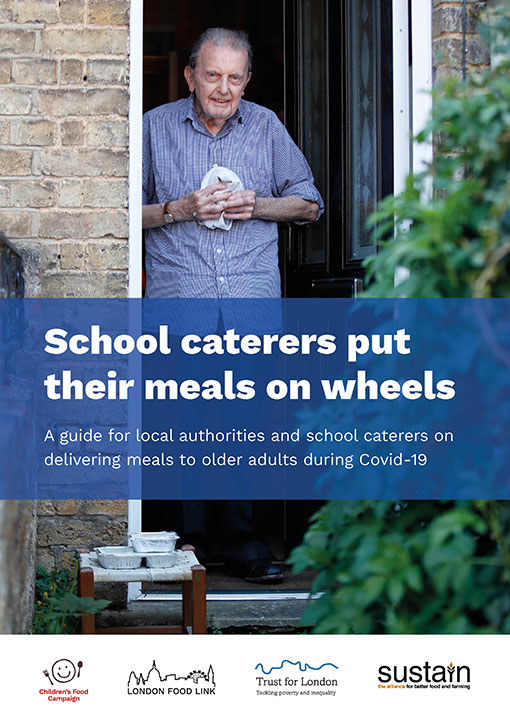
School caterers put their meals on wheels: a guide for local authorities and school caterers on delivering to older adults during Covid-19
18pp - 2020 | 1575Kb

School caterers put their meals on wheels: a guide for local authorities and school caterers on delivering to older adults during Covid-19
18pp - 2020 | 1575Kb
Kitchens, restaurants and caterers across the country have had to close during the Covid-19 crisis. This has had a range of impacts, including uncertainty around supply lines, security of employment, skills retention and even the ability to reopen at all post-lockdown. Sustain is particularly concerned that the expertise and supply networks of school kitchens and caterers are not being adequately put to use during this crisis, and that it will affect the long-term viability for schools to provide children with access to healthy and sustainable food.
Alongside this, thousands of older and clinically vulnerable adults are either self-isolating in their homes or struggling to access food. Many cannot cook at home and have limited access to meals or sufficient nutritious food. Meanwhile, meals on wheels services have been severely cut back in recent years. This has meant that in many areas there was no established meals on wheels provision to step in to provide nutritious meals for older and housebound people during the outbreak. Conversely, in response to Covid-19, some areas have rapidly created or scaled up meal delivery services. These have been able to make use of existing catering staff, skills, kitchens and foodservice supply lines to be able to supply older and housebound people with nutritious food and vital points of contact to help overcome isolation. They offer inspiration, as well as many lessons to be learned about how catering services can help to respond to crisis, now and in the future.
In this report, we set out four basic models for this transformation of school kitchens, each illustrated through a case study. We then set out preliminary guidance on how a school caterer or local authority can follow suit to make this change too.
This guide was written by Morven Oliver-Larkin, London Food Poverty Campaign Coordinator and Fran Bernhardt, Children's Food Campaign Coordinator with assistance from Simon Shaw, Ben Reynolds and Kath Dalmeny.
You can also listen back to the recording of our webinar to launch this report, here.
Sustain: Sustain The alliance for better food and farming advocates food and agriculture policies and practices that enhance the health and welfare of people and animals, improve the working and living environment, enrich society and culture and promote equity.
Sustain
The Green House
244-254 Cambridge Heath Road
London E2 9DA
020 3559 6777
sustain@sustainweb.org
Sustain advocates food and agriculture policies and practices that enhance the health and welfare of people and animals, improve the working and living environment, promote equity and enrich society and culture.
© Sustain 2024
Registered charity (no. 1018643)
Data privacy & cookies